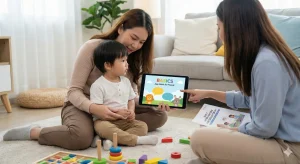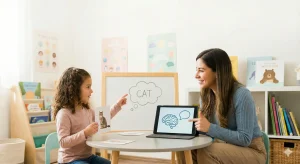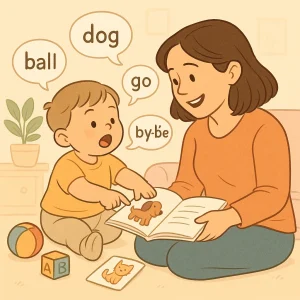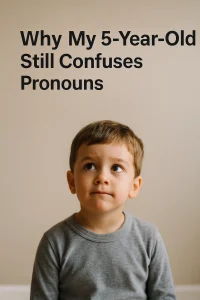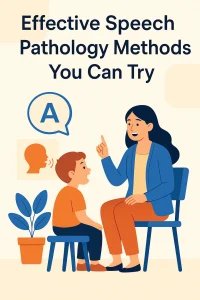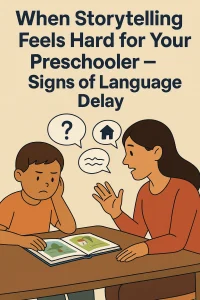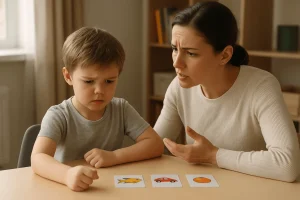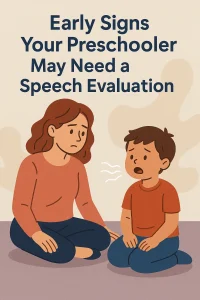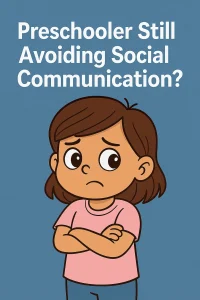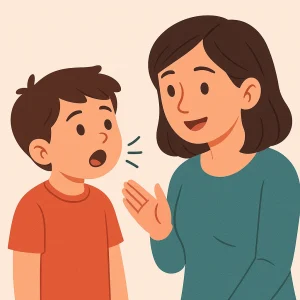Cognitive Development & Language: Guide for Parents
By Wellness Hub
Last Updated: December 4, 2024
Welcome to our exploration of cognitive development and its essential role in language learning! Cognitive development is the process through which we develop thinking skills, problem-solving abilities, and the capacity to understand the world key components for mastering any language. Understanding this process helps parents and educators effectively support children’s language skills, enhancing their ability to communicate and connect ideas meaningfully. Join us as we delve into practical strategies that foster this critical aspect of early learning, ensuring every child’s success in both academic and social settings.
Understanding Cognitive Development
What is Cognitive Development?
Cognitive development refers to how we learn to think, explore, and figure things out. It’s the process that enables children (and adults, too!) to develop the skills necessary for problem-solving, understanding relationships between concepts, and making sense of the world around them. This growth begins from infancy and continues well into adulthood, shaping our ability to communicate and interact with others effectively.
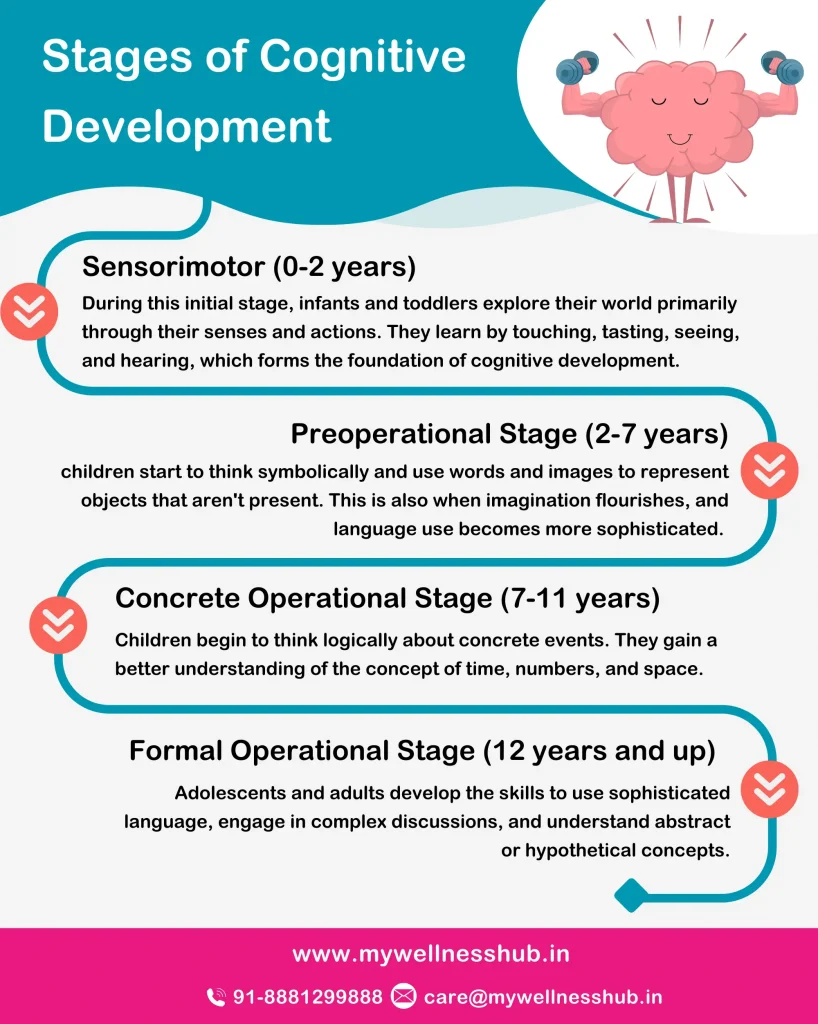
Stages of cognitive development important for language learning
- Sensorimotor Stage (0-2 years): In this initial phase, babies learn about the world through their senses and actions, like looking, touching, and listening. Though they might not be speaking yet, they’re learning to associate sounds with meanings, setting the stage for language development.
- Preoperational Stage (2-7 years): As toddlers and young children, they begin to think symbolically and use words and pictures to represent objects. During this stage, their vocabulary expands rapidly, and they start to grasp the rules of language and conversation.
- Concrete Operational Stage (7-11 years): Children start thinking logically about concrete events. They understand the concept of conservation (that quantity doesn’t change despite changes in the shape of containers), which helps in more complex grammar and language use.
- Formal Operational Stage (12 years and up): The final stage introduces the ability to think abstractly and reason about hypothetical problems. Teens begin to use sophisticated language and understand metaphors and idioms, enhancing their communication skills.
Stages of Cognitive Development and Their Impact on Language Learning
| Stage | Age Range | Key Features | Impact on Language Learning |
| Sensorimotor | 0-2 years | Learning through senses and actions. | Begins understanding of words and simple commands. |
| Preoperational | 2-7 years | Using symbols and language to represent objects. | Rapid vocabulary expansion and basic grammar understanding. |
| Concrete Operational | 7-11 years | Logical thinking about concrete events. | Enhanced ability to understand complex grammar and syntax. |
| Formal Operational | 12+ years | Abstract and hypothetical thinking. | Ability to use and understand advanced language and figurative speech. |
Theories About Learning Language
Key Ideas About How We Learn To Talk
Learning language is a complex process that involves several theories that attempt to explain how we acquire the ability to communicate. Let’s explore a few key ideas:
- Behaviorist Theory: This theory, led by B.F. Skinner, suggests that language learning is a result of operant conditioning. Children learn language through imitation, reinforcement, and repetition. When a child says something correctly and receives positive feedback, they are more likely to use that language again.
- Nativist Theory: Proposed by Noam Chomsky, the nativist theory argues that the ability to learn language is inborn, suggesting that all humans have a language acquisition device (LAD) that allows them to produce language once they are exposed to it.
- Social Interactionist Theory: This theory emphasizes the role of social interaction in language development. Lev Vygotsky, a key proponent, argued that language acquisition happens through social interactions and mediated learning with more knowledgeable others.
- Cognitive Theory: Jean Piaget’s theory asserts that cognitive development and language acquisition are closely linked. According to this theory, children’s speech patterns reflect their cognitive abilities and that language development follows cognitive development.
How these ideas help in teaching languages
Understanding these theories can significantly enhance the way languages are taught. Here’s how:
- Behaviorist approaches: Teachers can create a positive learning environment where correct language use is consistently reinforced. Reward systems and repetitive practice can be effective, especially in the early stages of learning.
- Nativist insights: Educators can focus on creating language-rich environments that trigger the innate capabilities of learners. This might include exposing learners to a variety of linguistic inputs at an early age.
- Social interactionist methods: Language lessons can be designed to be more interactive, encouraging dialogue and communication. Group activities and peer interactions can be crucial in developing language skills.
- Cognitive strategies: Activities can be tailored to align with the cognitive development stages of learners. For instance, using concrete objects during lessons when teaching young children can be more effective until they are able to handle more abstract concepts.
How Wellness Hub Helps
Introduction to Wellness Hub’s Mission and Resources
At Wellness Hub, we’re dedicated to empowering everyone involved in the learning process—parents, educators, and therapists—with effective tools and resources. Our goal is to support cognitive and language development for learners of all ages, making education both accessible and enjoyable.
How Our Tools and Guides Aid in Cognitive and Language Development
- Interactive Tools: Our apps and software engage kids with fun games that boost language skills and encourage active learning.
- Educational Guides: Developed with experts, these guides help teach language step-by-step, supporting both learners and educators.
- Customizable Learning Plans: Every child learns differently. Our flexible plans let kids learn at their own pace, improving their language and thinking skills.
- Workshops for Parents and Educators: We offer workshops that provide practical tips on teaching language and supporting cognitive growth.
- Accessible Resources: With materials in various languages and formats, we make sure learning is open to everyone.
Conclusion
Understanding cognitive development is key to helping children learn language effectively. At Wellness Hub, we provide the tools and resources needed to support this essential learning phase. Our interactive tools, guides, and customizable plans are perfect for both parents and educators looking to enhance language skills in children.
Explore Wellness Hub’s offerings and discover how our solutions can make learning engaging and effective. Check out our resources and see how you can support the development of language skills from an early age. Visit us at Wellness Hub and start enhancing your child’s learning journey today.
Frequently Asked Questions:
1. What is cognitive development in children?
Cognitive development refers to how children grow in their ability to think, solve problems, and understand the world. This development influences their skills in areas like memory, attention, and language, which are crucial for effective communication as they grow.
2. How does cognitive development affect language learning?
Cognitive growth helps children grasp language by allowing them to process sounds, recognize symbols (like letters), and eventually understand and use words and sentences in communication. As their brains develop, they can handle more complex language tasks.
3. At what age is language development most crucial?
Language development is particularly crucial from birth through age 5. During these early years, children are especially receptive to learning sounds and words, which forms the foundation for all future language and literacy skills.
4. What are the stages of cognitive development?
Cognitive development typically follows four stages:
- Sensorimotor (0-2 years): Children learn through actions and sensory experiences.
- Preoperational (2-7 years): They begin using symbols and language to think and communicate.
- Concrete operational (7-11 years): Logical thinking develops with a focus on concrete information.
- Formal operational (12 years and up): Abstract and hypothetical thinking emerges, enhancing problem-solving and planning skills.
5. How can parents support their child’s language learning at home?
Parents can support language development by talking to their children often, reading books together, singing songs, and engaging in storytelling. Playing educational games that involve naming objects and describing actions also helps build vocabulary and grammar skills.
6. What tools does Wellness Hub offer to support cognitive and language development?
Wellness Hub provides a variety of tools designed to support children’s cognitive and language development. These include interactive educational apps, step-by-step guides for teaching language skills, and personalized learning plans that adapt to each child’s unique pace of development.
7. Can playing games improve a child’s language skills?
Yes, playing language-rich games can significantly enhance a child’s vocabulary and understanding of language structure. Games that require children to follow instructions, describe scenes, or create stories can be particularly effective.
8. What should parents do if they’re concerned about their child’s language development?
If parents have concerns about their child’s language development, it’s important to consult with a pediatrician or a speech-language pathologist. These professionals can assess the child’s language abilities and offer specific strategies or interventions to help them improve.
9. How often should parents read to their children to help with language development?
Reading daily to children is highly beneficial. It exposes them to a range of vocabulary, helps them understand how sentences are structured, and develops listening and comprehension skills. Even a few minutes each day can have a significant impact.
10. Where can I find resources to help with my child’s language development?
For a wide range of resources specifically designed to support language development, parents can visit the Wellness Hub website at Wellness Hub. Here, you’ll find interactive tools, educational materials, and advice tailored to help children enhance their language skills at various stages of development.
About the Author:
Shravanaveena Gajula
M.Sc ., Speech and Language Pathology (5+ years of experience)
Shravanaveena Gajula is a dedicated Audiologist and Speech-Language Pathologist with a BASLP and an M.Sc in Speech and Language Pathology. With experience spanning multiple settings, including Wellness Hub and Ashray Akruti, Veena specializes in a wide range of disorders from developmental issues in children to speech and language assessments in adults. Her expertise includes parent counseling, managing speech sound and fluency disorders, and creating individualized therapy programs. Veena is also PROMPT certified and an author of several insightful blogs on speech and language pathology, aiming to educate and assist caregivers in supporting their loved ones.
Book your Free Consultation Today
Parent/Caregiver Info:
Client’s Details:
* Error Message
